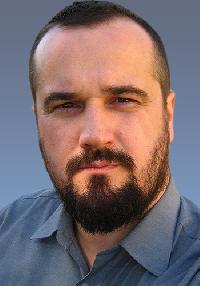Are there any other artifical lang Thread poster: Mercer32208
|
|---|
I know about ido and Esperanto and Esata are there any new artificial languages out there that came about in the last 20 years thanks
| | | | | Sure, lots of new programming languages ... | Aug 4, 2009 |
... like Java (released in 1995), Python (1991), Ruby (also in 1995). These are the ones that come immediately to mind. I'm sure that there are a plenty of niche languages I've never heard of and never will hear of.
| | | | Samuel Murray 
Netherlands
Local time: 08:04
Member (2006)
English to Afrikaans
+ ...
| Google for... | Aug 4, 2009 |
Mercer32208 wrote:
I know about ido and Esperanto and Esata are there any new artificial languages out there that came about in the last 20 years?
Google for "conlang". There are even web sites where people can introduce their own little languages and discuss various ways of creating them.
| | | | | Don't forget Klingonian | Aug 4, 2009 |
... for what it's worth
| | |
|
|
|
Erik Freitag 
Germany
Local time: 08:04
Member (2006)
Dutch to German
+ ...
| Klingonian is too old | Aug 4, 2009 |
Wolfgang Jörissen wrote: ... for what it's worth 
Klingonian seems to be older than 20 years, though ...
Andjustinordertoofacilitatereadingfortheopklingonianseemstobelolderthan20years
[Bearbeitet am 2009-08-04 09:51 GMT]
| | | | Dejan Škrebić 
Bosnia and Herzegovina
Local time: 08:04
English to Serbian
+ ...
SITE LOCALIZER |
Mercer32208 wrote:
I know about ido and Esperanto and Esata are there any new artificial languages out there that came about in the last 20 years thanks
Actually, yes. Hundreds of them. But it depends a bit how you describe "artificial language". New languages are presented almost on a daily base, but generally, it's messages of the type "Hey, I've created a new language. It's called _____ and here comes the phonology" - and that's all we will ever hear of it. Most other conlangs are more than that, but the number of them that are actually big enough to write something substantial in is very limited. Still, there are quite a few of them around!
An interesting one to mention is Brithenig, a Romance language that underwent sound changes similar to those of Welsh. Absolutely worth a visit! I've done something similar myself with Wenedyk, a Romance language based on Polish. Well worth mentioning is Sylvia Sotomayor's language Kélen, a language that has no verbs. Actually, I could name quite a few interesting projects... One that has become quite well-known is Na'vi, made for the movie "Avatar". A very nice Romance language without a backstory but with an impressing corpus is called Aingeljã.
In the field of international auxiliary languages, new projects are being launched frequently as well. However, most of them are completely unsuccessful. A language that enjoys some success is Lingua Franca Nova, but it was started in 1965, so it falls outside the reach of your question. Perhaps I should also mention Slovianski, a simplified interslavic language I'm co-author of and that has been a lot in the news lately. Interesting pan-Romance languages are Romanica and Romanova.
Best regards,
Jan
| | | | DZiW (X)
Ukraine
English to Russian
+ ...
| what's the use? | Mar 2, 2010 |
I see language as a means of communication (or some would say 'intercourse
'). It's pretty clear that ancient and dead languages reflected their culture, development and so on.
But what exactly does a 'new' man-made 'neutral' language? Perhaps, it's an attempt to make some 'compromise' while pretending to be an affected parent language for shifting the bright features and distinctions of many, right?
May be it's just difference of opinions, but I'd better learn ab... See more I see language as a means of communication (or some would say 'intercourse
'). It's pretty clear that ancient and dead languages reflected their culture, development and so on.
But what exactly does a 'new' man-made 'neutral' language? Perhaps, it's an attempt to make some 'compromise' while pretending to be an affected parent language for shifting the bright features and distinctions of many, right?
May be it's just difference of opinions, but I'd better learn about a dead language which was naturally spoken by thousands of real people several centuries ago. Frankly speaking I can't find any practical use for AL because I only once got Ukrainian> Esperanto offer, yet English turned out to be more desirable)
Cheers ▲ Collapse
| | |
|
|
|
Krzysztof Kajetanowicz (X) 
Poland
Local time: 08:04
English to Polish
+ ...
| the commitment | Mar 2, 2010 |
The commitment to this sort of science amazes me.
It's like determining whether it is better to be smashed over the head with a full bottle of beer or with an empty bottle. Or making a frog levitate. Must be pure, useless joy!
http://improbable.com/ig/ig-pastwinners.html
| | | |
Krzysztof Kajetanowicz wrote: The commitment to this sort of science amazes me. It's like determining whether it is better to be smashed over the head with a full bottle of beer or with an empty bottle. Or making a frog levitate. Must be pure, useless joy! http://improbable.com/ig/ig-pastwinners.html
Hehe, I must admit that I had a really good laugh when I read this! Wouldn't mind getting nominated for that Prize! Wouldn't mind getting nominated for that Prize!
But seriously, I wouldn't call this "science". It's rather the thing that is between science and art. In my opinion, that's quite a natural thing. Many sciences have their counterpart in art as well, and vice versa.
In music, for example, there are composers, performers and musicologists. Being a good performer is not merely a matter of interpreting a composition; it is also a matter of following the train of thought of the composer. You have to understand WHY the composer used these notes instead of other notes, what story he's trying to tell and how the means he's using actually work. Without that, you can play the notes very nicely, throw in all your emotions, and the people might even like it, but it's not the real piece.
To achieve this, knowledge is required, and this is where science comes in. Musicology in particular. All in all, a good musician has to be a little of everything: composer, performer and musicologist, albeit obviously not to the same degree.
And now, here goes: from asking yourself the question "why did the composer use this and not something else?", it's only a small step towards another question: "and what would have happened íf he had done it differently?"
I have always been fascinated by that sort of questions. Not only in the field of music or linguistics, but in other fields as well. I suppose it's a kind of playfullness that is part of my character. I studied history, but what always annoyed me was that questions like "so what would have happened if ..." were never allowed. And it's the same thing with languages. I've always liked asking myself questions like: "What would Polish have looked like if it were a Romance language?" or "We all know that there are East, West and South Slavic languages, but why isn't there a North Slavic group? And if there were, what would it look like? Gotta fix that!" It's like throwing a ball and keep watching it until it stops somewhere. Just like many poems and novels, conlangs are works of poetry or speculative fiction.
Useless? Of course! Joy? Absolutely, if you like this sort of things! I mean, what is the use of a poem? Or a symphony? Or a painting? Or a movie? Obviously nothing, except the pleasure of spending a little while with it. I have always enjoyed watching languages or listening to them, and just like I write music that I would like to have existed in reality, I also create languages that I would have liked to have existed in reality.
Jan
[Edited at 2010-03-02 13:00 GMT]
| | | | Jeff Whittaker 
United States
Local time: 02:04
Member (2002)
Spanish to English
+ ...
| To report site rules violations or get help, contact a site moderator: You can also contact site staff by submitting a support request » Are there any other artifical lang | Protemos translation business management system | Create your account in minutes, and start working! 3-month trial for agencies, and free for freelancers!
The system lets you keep client/vendor database, with contacts and rates, manage projects and assign jobs to vendors, issue invoices, track payments, store and manage project files, generate business reports on turnover profit per client/manager etc.
More info » |
| | Trados Studio 2022 Freelance | The leading translation software used by over 270,000 translators.
Designed with your feedback in mind, Trados Studio 2022 delivers an unrivalled, powerful desktop
and cloud solution, empowering you to work in the most efficient and cost-effective way.
More info » |
|
| | | | X Sign in to your ProZ.com account... | | | | | |










